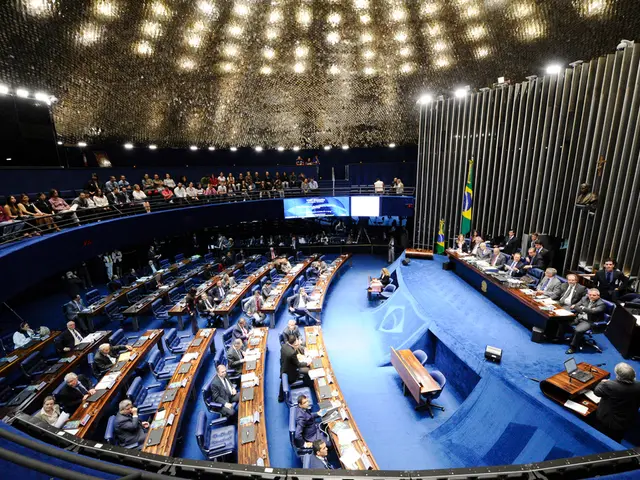Departments of Interior and Agriculture plan to unite wildfire combat teams
The U.S. Congress is considering a stopgap spending bill that extends the Cybersecurity Information Sharing Act of 2015 until November 21. This legislation, aimed at enhancing cybersecurity cooperation between the government and private sector, will continue to be in effect for the near future.
In the realm of firefighting, the Departments of Interior and Agriculture have announced plans to combine their wildland firefighting forces into a single agency by January 2026. This new entity, the U.S. Wildland Fire Service, is expected to streamline operations and improve response times to wildfires across the country.
The Government Accountability Office has highlighted potential overlaps in the Pentagon's cyber operations, which rely on numerous support offices. This finding suggests a need for streamlining and consolidation to ensure efficiency and effectiveness in these critical operations.
House Democrats have urged the Federal Emergency Management Agency to reinstate employees who signed a whistleblower letter regarding staffing cuts and changes under the Trump administration. The reinstatement of these employees could provide valuable insights and ensure continuity in the agency's operations.
Senate Democrats have introduced the Protect America's Workforce Act, a bill aimed at nullifying President Trump's executive orders that would strip union protections from federal employees. A companion bill has also been introduced to reinforce this legislation's impact.
The General Services Administration's procurement consolidation pilot programs have delivered results, with the Department of Housing and Urban Development transferring the buying of common goods and services to GSA. This consolidation is expected to lead to cost savings and improved efficiency in government procurement.
The U.S. Wildland Fire Service, a combined agency of the Departments of Interior and Agriculture, is scheduled to be operational by January 2026. The Pentagon's cyber operations, on the other hand, continue to grapple with multiple support offices, some of which may have overlapping functions.
The Space Force has activated a new unit, System Delta 81, to develop its testing and training environment. The Air Force is also activating a new 'system delta' unit, System Delta 81, to build the underlying infrastructure for connecting and integrating test and training events.
The Defense Logistics Agency is facing challenges in complying with "buy American" requirements, according to an audit by the DoD Inspector General. The Air Force is also making changes to its staffing, reducing the size of the staffs supporting the Office of Small Disadvantaged Business Utilization, the principal cyber advisor, and eliminating certain titles and strategic communications support.
These developments underscore the ongoing efforts to improve efficiency, streamline operations, and ensure accountability within the U.S. government. As these changes unfold, it will be interesting to see how they impact the various agencies and their operations.
Read also:
- United States tariffs pose a threat to India, necessitating the recruitment of adept negotiators or strategists, similar to those who had influenced Trump's decisions.
- Weekly happenings in the German Federal Parliament (Bundestag)
- Southwest region's most popular posts, accompanied by an inquiry:
- Discussion between Putin and Trump in Alaska could potentially overshadow Ukraine's concerns







